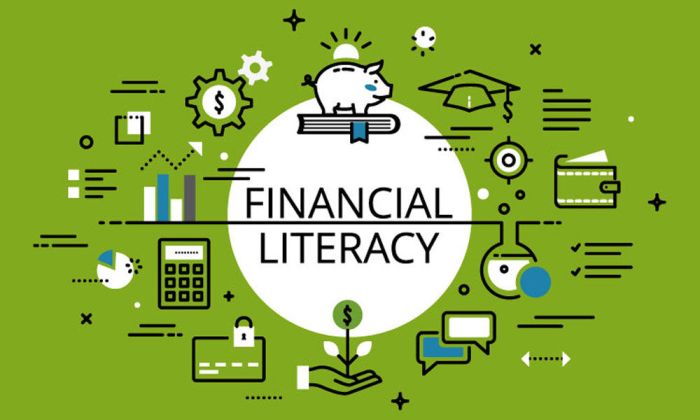Financial literacy is the key to unlocking a world of financial success and security. From understanding budgeting to navigating investments, being financially savvy is crucial in today’s fast-paced world. Let’s dive into the essentials of financial literacy and explore how it can shape your financial future.
Importance of Financial Literacy
Financial literacy is crucial for individuals to make informed financial decisions, manage their money effectively, and plan for their future. It empowers people to understand concepts like budgeting, saving, investing, and debt management, which are essential for financial stability and growth.
Impact on Personal Finances
- Individuals with financial literacy are better equipped to create and stick to a budget, leading to improved spending habits and increased savings.
- Being financially literate helps individuals make smart investment decisions, potentially leading to higher returns and long-term wealth accumulation.
- Understanding concepts like compound interest and debt management can prevent individuals from falling into financial traps and accumulating unnecessary debt.
Long-Term Benefits
- Financially literate individuals are more likely to achieve their financial goals, such as buying a home, starting a business, or retiring comfortably.
- People with financial literacy are better prepared for unexpected expenses or financial emergencies, reducing the impact on their overall financial well-being.
- By developing good financial habits early on, individuals can secure their financial future and build wealth over time, leading to a more stable and secure life.
Key Concepts in Financial Literacy
Financial literacy involves understanding essential concepts that are crucial for managing money effectively. Let’s explore some key terms that form the foundation of financial literacy.
Budgeting
Budgeting is the process of creating a plan to manage your income and expenses. It helps you track where your money is going and ensures you are living within your means.
Saving
Saving involves setting aside a portion of your income for future needs or emergencies. It is important to build a savings cushion to cover unexpected expenses and achieve financial goals.
Investing
Investing is the process of putting your money into financial products with the expectation of earning a return. It allows your money to grow over time through the power of compound interest.
Debt Management
Debt management involves handling the debt you owe in a responsible manner. It is crucial to understand the terms of your loans, pay them off on time, and avoid accumulating excessive debt.
Assets vs. Liabilities
Assets are items of value that you own, such as cash, investments, or real estate. Liabilities, on the other hand, are debts or financial obligations that you owe. Understanding the difference between assets and liabilities is essential for building wealth.
Compound Interest
Compound interest is the interest calculated on the initial principal and also on the accumulated interest of previous periods. It allows your investments to grow exponentially over time. As Albert Einstein famously said, “Compound interest is the eighth wonder of the world.”
Strategies for Improving Financial Literacy

Improving financial literacy is crucial for making informed decisions about money management. Here are some tips to enhance your financial literacy:
Utilize Online Resources and Tools
- Explore websites and apps that offer financial education resources, such as Khan Academy, Investopedia, or Mint.
- Use budgeting tools like You Need a Budget (YNAB) or Personal Capital to track your expenses and income.
Attend Financial Education Programs, Financial literacy
- Participate in workshops or seminars offered by local community centers, libraries, or financial institutions.
- Enroll in online courses or webinars focused on personal finance and investment strategies.
Read Books and Articles on Finance
- Explore books like “Rich Dad Poor Dad” by Robert Kiyosaki or “The Total Money Makeover” by Dave Ramsey.
- Follow finance blogs or subscribe to financial magazines like Money Magazine or The Wall Street Journal.
Seek Guidance from Financial Advisors
- Consult with a certified financial planner or advisor to get personalized advice on budgeting, saving, and investing.
- Attend financial planning sessions to create a roadmap for achieving your financial goals.
Impact of Financial Literacy on Society
Improving financial literacy can have a significant positive impact on communities and economies. When individuals are better equipped to manage their finances, they are more likely to make informed decisions about saving, investing, and budgeting. This, in turn, can lead to increased financial stability and security for individuals and families, as well as overall economic growth.
Benefits of Financial Literacy Initiatives
- Financially literate individuals are better positioned to plan for their future and retirement, reducing the likelihood of financial hardships in old age.
- Improved financial literacy can lead to a decrease in debt levels and an increase in savings rates, contributing to overall economic resilience.
- Communities with higher levels of financial literacy tend to have lower rates of poverty and economic inequality, fostering a more prosperous society.
Consequences of a Lack of Financial Literacy
- A lack of financial literacy can result in individuals making poor financial decisions, such as taking on excessive debt or falling victim to financial scams.
- Without the necessary financial knowledge, individuals may struggle to navigate complex financial products and services, leading to missed opportunities for wealth accumulation.
- Low levels of financial literacy can perpetuate cycles of poverty and hinder social mobility, creating long-term economic challenges for society as a whole.
